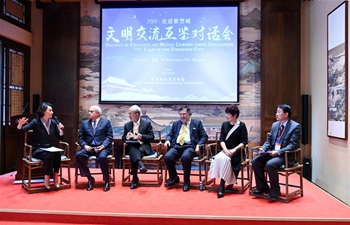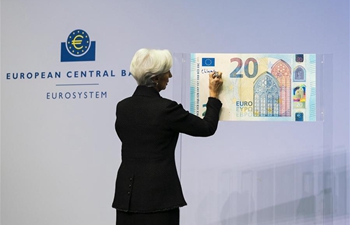BERLIN, Nov. 29 (Xinhua) -- Germany's Minister for Economic Affairs and Energy Peter Altmaier (CDU) presented the final version of his country's "National Industry Strategy 2030" Friday, which lays out a "comprehensive concept for securing prosperity and jobs of the future."
At a news confrence in Berlin, Altmaier outlined the strategy which comprises three pilars.
The first pillar of the strategy is to "improve the framework conditions" for Germany as an industrial location, Altmaier's ministry (BMWi) said in a statement.
To this end, the strategy proposes measures such as making corporate taxes more competitive, capping the social security contributions, mobilizing skilled workers and reducing bureaucracy.
A new tax policy, which caps the "tax burden on our companies at a rate of 25 percent" so that Germany becomes an internationally competitive business location, would be a key goal, commented Dieter Kempf, president of the Federation of German Industries (BDI).
The second pillar of the industrial strategy would strengthen new technologies and mobilize private capital. Germany and Europe would have to develop and apply "game-changer technologies," such as artificial intelligence (AI), according to the BMWi.
In addition, the country's innovation potential would have to be activated, ensuring that more technological innovations are applied in practice, the BMWi said.
This would mean advancing technology investments, setting the course for effective climate protection with a low-emission industry and carbon dioxide capture and storage (CCS), further developing the bioeconomy as well as promoting lightweight construction.
The third pillar is to maintain technological sovereignty in a global context. In particular, losses of know-how would have to be avoided and self-determination in key technological fields would have to be maintained.
"We welcome the general commitment to liberal policies for foreign investors in Germany," said BDI President Kempf. German industry would not be in favor of the government having the option of securing technological sovereignty by interfering with open market principles.
As a last resort, however, the new strategy allows governmental interference in selected cases. "Temporary state participation should be considered and offered in individual cases via a national participation instrument," the BMWi stated.
Back in February, Altmaier presented his first proposals for an industry strategy, which were met with heavy criticism. In recent months, "intensive dialogues" have been held with representatives from industry, politics, trade unions and academia, according to the BMWi.













